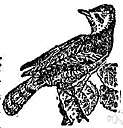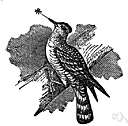wryneck
Also found in: Thesaurus, Medical, Encyclopedia, Wikipedia.
Related to wryneck: piculet
wry·neck
(rī′nĕk′)n.
1. Either of two small woodpeckers, Jynx torquilla of Eurasia and Africa or J. ruficollis of sub-Saharan Africa, having a sharply pointed bill and the ability to twist the neck almost all the way around.
2.
a. See torticollis.
b. A person with torticollis.
American Heritage® Dictionary of the English Language, Fifth Edition. Copyright © 2016 by Houghton Mifflin Harcourt Publishing Company. Published by Houghton Mifflin Harcourt Publishing Company. All rights reserved.
wryneck
(ˈraɪˌnɛk)n
1. (Animals) either of two cryptically coloured Old World woodpeckers, Jynx torquilla or J. ruficollis, which do not drum on trees
2. (Pathology) another name for torticollis
3. (Pathology) informal a person who has a twisted neck
Collins English Dictionary – Complete and Unabridged, 12th Edition 2014 © HarperCollins Publishers 1991, 1994, 1998, 2000, 2003, 2006, 2007, 2009, 2011, 2014
wry•neck
(ˈraɪˌnɛk)n.
1. Informal.
a. torticollis.
b. a person having torticollis.
2. either of two small Old World birds of the genus Jynx, of the woodpecker family, with mottled gray-brown plumage: noted for their snakelike contortions of the neck when disturbed on the nest.
[1575–85]
Random House Kernerman Webster's College Dictionary, © 2010 K Dictionaries Ltd. Copyright 2005, 1997, 1991 by Random House, Inc. All rights reserved.
ThesaurusAntonymsRelated WordsSynonymsLegend:
Switch to new thesaurus
| Noun | 1. |  wryneck - an unnatural condition in which the head leans to one side because the neck muscles on that side are contracted wryneck - an unnatural condition in which the head leans to one side because the neck muscles on that side are contractedabnormalcy, abnormality - an abnormal physical condition resulting from defective genes or developmental deficiencies |
| 2. |  wryneck - Old World woodpecker with a peculiar habit of twisting the neck wryneck - Old World woodpecker with a peculiar habit of twisting the neckpeckerwood, woodpecker, pecker - bird with strong claws and a stiff tail adapted for climbing and a hard chisel-like bill for boring into wood for insects genus Jynx, Jynx - wrynecks |
Based on WordNet 3.0, Farlex clipart collection. © 2003-2012 Princeton University, Farlex Inc.
Translations
nyaktekercs
Collins Spanish Dictionary - Complete and Unabridged 8th Edition 2005 © William Collins Sons & Co. Ltd. 1971, 1988 © HarperCollins Publishers 1992, 1993, 1996, 1997, 2000, 2003, 2005